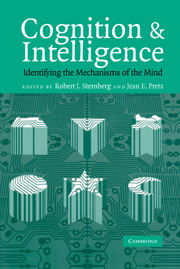Book contents
- Frontmatter
- Contents
- Preface
- 1 Information Processing and Intelligence: Where We Are and Where We Are Going
- 2 Mental Chronometry and the Unification of Differential Psychology
- 3 Reductionism versus Charting: Ways of Examining the Role of Lower-Order Cognitive Processes in Intelligence
- 4 Basic Information Processing and the Psychophysiology of Intelligence
- 5 The Neural Bases of Intelligence: A Perspective Based on Functional Neuroimaging
- 6 The Role of Working Memory in Higher-Level Cognition: Domain-Specific versus Domain-General Perspectives
- 7 Higher-Order Cognition and Intelligence
- 8 Ability Determinants of Individual Differences in Skilled Performance
- 9 Complex Problem Solving and Intelligence: Empirical Relation and Causal Direction
- 10 Intelligence as Smart Heuristics
- 11 The Role of Transferable Knowledge in Intelligence
- 12 Reasoning Abilities
- 13 Measuring Human Intelligence with Artificial Intelligence: Adaptive Item Generation
- 14 Marrying Intelligence and Cognition: A Developmental View
- 15 From Description to Explanation in Cognitive Aging
- 16 Unifying the Field: Cognition and Intelligence
- Author Index
- Subject Index
- References
12 - Reasoning Abilities
Published online by Cambridge University Press: 23 November 2009
- Frontmatter
- Contents
- Preface
- 1 Information Processing and Intelligence: Where We Are and Where We Are Going
- 2 Mental Chronometry and the Unification of Differential Psychology
- 3 Reductionism versus Charting: Ways of Examining the Role of Lower-Order Cognitive Processes in Intelligence
- 4 Basic Information Processing and the Psychophysiology of Intelligence
- 5 The Neural Bases of Intelligence: A Perspective Based on Functional Neuroimaging
- 6 The Role of Working Memory in Higher-Level Cognition: Domain-Specific versus Domain-General Perspectives
- 7 Higher-Order Cognition and Intelligence
- 8 Ability Determinants of Individual Differences in Skilled Performance
- 9 Complex Problem Solving and Intelligence: Empirical Relation and Causal Direction
- 10 Intelligence as Smart Heuristics
- 11 The Role of Transferable Knowledge in Intelligence
- 12 Reasoning Abilities
- 13 Measuring Human Intelligence with Artificial Intelligence: Adaptive Item Generation
- 14 Marrying Intelligence and Cognition: A Developmental View
- 15 From Description to Explanation in Cognitive Aging
- 16 Unifying the Field: Cognition and Intelligence
- Author Index
- Subject Index
- References
Summary
The topic of human intelligence exceeds the span of any one discipline or method of inquiry. Different aspects of intelligence are best understood from disciplines as diverse as evolutionary biology, neuropsychology, cognitive psychology, anthropology, and education. At its core, however, intelligence is defined by differences between individuals or species. To say that one individual is more intelligent than another is to make a value judgment. Theories of human intelligence must therefore be able to explain those behaviors or accomplishments that societies value as indicants of intelligence (Sternberg, 1985). Such explanations may, at one extreme, invoke the action of neural mechanisms (Garlick, 2002) or, at the other extreme, the importance of social processes (Vygotsky, 1978). Ultimately, however, the theory must explain individual differences in those complex human behaviors that are most commonly understood as indicants of intelligence. Thus, the central facts to be explained by a theory of intelligence must go beyond faster or more efficient processing of elementary tasks, for example, or the efficiency of biological processes and inherited structures, or the influence of schools, environments, or even cultures. Rather, a theory of intelligence must explain the writing of novels, the solving of complex mathematical problems, the designing of skyscrapers and microchips, and the myriad other forms of complex cognition valued by society. In short, an understanding of how individuals solve complex tasks and an explanation of why they differ so markedly in their ability to do so are central facts for any theory of intelligence.
- Type
- Chapter
- Information
- Cognition and IntelligenceIdentifying the Mechanisms of the Mind, pp. 225 - 250Publisher: Cambridge University PressPrint publication year: 2004
References
- 1
- Cited by



